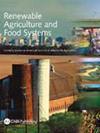Preliminary findings of northeast organic and conventional dairy farmers' perception of benefits and challenges in feeding algae
IF 2
3区 农林科学
Q2 AGRICULTURE, MULTIDISCIPLINARY
引用次数: 0
Abstract
Abstract Enteric fermentation from livestock accounts for over a quarter of the United States' methane emissions. A potent greenhouse gas, methane has 80 times the global warming potential of carbon dioxide over a 20-year period. An emerging focus of research is the incorporation of algae (e.g., kelp, seaweed or microalgae) into livestock feed, with several studies documenting dramatic suppression of enteric methane emissions in cattle. As part of a nationwide multidisciplinary study of using algae feed supplements to reduce methane emissions and improve dairy productivity, we used focus groups and individual interviews to measure organic and conventional dairy farmer's knowledge and opinions of algae-based feed supplements. Our goals were to learn what both organic and conventional dairy farmers know about algae-based feed supplements, why they do or do not feed them to their cows and if they were interested in the methane-reducing potential of these algal-based feeds. We also sought to understand where they get valued information about animal nutrition. We found most farmers were aware of algae-based feed supplements on the market, but organic farmers were more familiar with marketing claims. Farmers reported feeding algae-based feed supplements to address herd health concerns, especially reproductive issues and pink eye, but expressed rising costs of the supplements as an obstacle. Both organic and conventional farmers expressed interest in suppressing methane emissions, but only if incentives are provided. Lastly, participants receive trusted information about feed supplements from their dairy nutritionists, who help them make decisions around feed purchasing and rations.东北地区有机奶农和传统奶农对饲养藻类的好处和挑战的看法的初步调查结果
摘要牲畜的肠道发酵占美国甲烷排放量的四分之一以上。甲烷是一种强效温室气体,在20年的时间里,其全球变暖潜力是二氧化碳的80倍。一个新的研究重点是将藻类(如海带、海藻或微藻)掺入牲畜饲料中,几项研究记录了牛肠道甲烷排放的显著抑制。作为一项关于使用藻类饲料补充剂减少甲烷排放和提高奶牛生产力的全国性多学科研究的一部分,我们使用焦点小组和个人访谈来衡量有机和传统奶农对藻类饲料补充剂的了解和意见。我们的目标是了解有机和传统奶农对藻类饲料补充剂的了解,他们为什么给奶牛喂食或不喂食,以及他们是否对这些藻类饲料减少甲烷的潜力感兴趣。我们还试图了解他们从哪里获得有关动物营养的宝贵信息。我们发现,大多数农民都知道市场上的藻类饲料补充剂,但有机农民更熟悉营销说法。农民们报告说,喂养藻类饲料补充剂是为了解决群体健康问题,特别是生殖问题和红眼病,但他们表示,补充剂成本的上涨是一个障碍。有机和传统农民都表示有兴趣抑制甲烷排放,但前提是要提供激励措施。最后,参与者从他们的乳制品营养学家那里获得关于饲料补充剂的可靠信息,他们帮助他们就饲料购买和配给做出决定。
本文章由计算机程序翻译,如有差异,请以英文原文为准。
求助全文
约1分钟内获得全文
求助全文
来源期刊

Renewable Agriculture and Food Systems
农林科学-农业综合
CiteScore
5.20
自引率
7.40%
发文量
39
审稿时长
>36 weeks
期刊介绍:
Renewable Agriculture and Food Systems (formerly American Journal of Alternative Agriculture) is a multi-disciplinary journal which focuses on the science that underpins economically, environmentally, and socially sustainable approaches to agriculture and food production. The journal publishes original research and review articles on the economic, ecological, and environmental impacts of agriculture; the effective use of renewable resources and biodiversity in agro-ecosystems; and the technological and sociological implications of sustainable food systems. It also contains a discussion forum, which presents lively discussions on new and provocative topics.
 求助内容:
求助内容: 应助结果提醒方式:
应助结果提醒方式:


